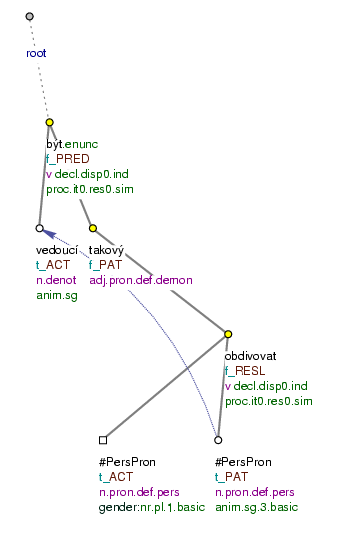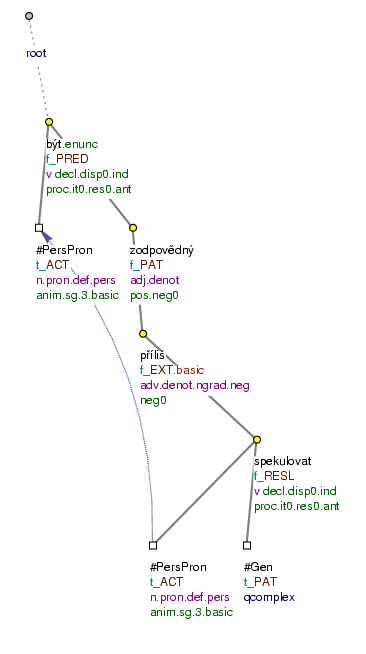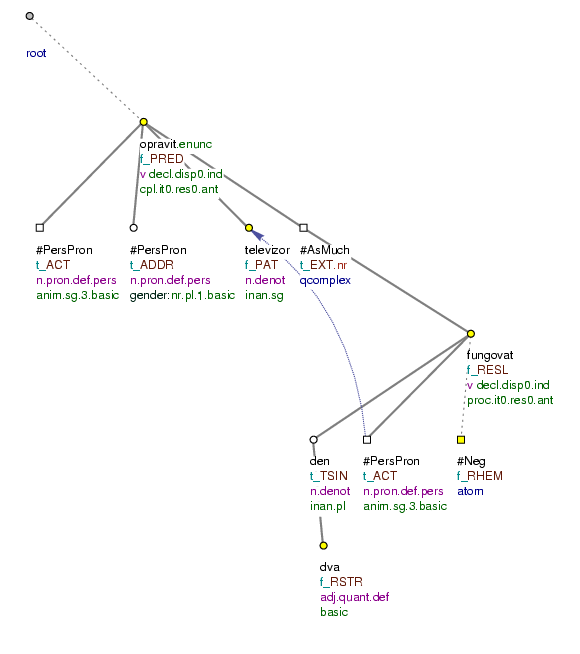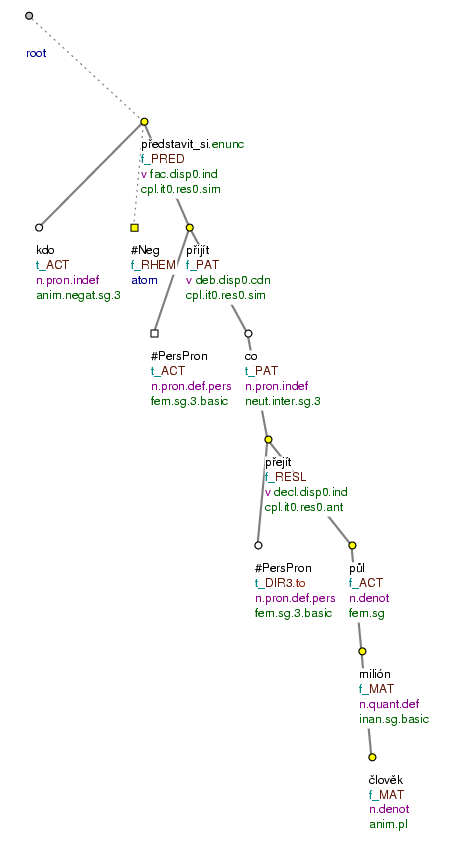A dependent consecutive clause is such a clause that refers to a result that is a consequence of the high or low degree of an aspect/circumstance of the event in the governing clause. A dependent consecutive clause is introduced (in the governing clause) by expressions expressing the high or low degree of an aspect/circumstance of the event, e.g.: tolik (=so much), natolik (=to such a degree), příliš (=too), tak (=so), takový (=such), dost (=enough), dostatečně (=enough), do té míry (=to that extent).
We distinguish:
-
the governing clause.
The governing clause contains:
-
the expression referring to the high or low degree of an aspect of the governing event.
-
-
the dependent consecutive clause.
-
the (subordinating) connective.
The dependent consecutive clause is usually connected by the following connectives:
-
že,
-
než aby,
-
na to aby.
-
Example:
-
Mám ruce zmrzlé tak, že je nenatáhnu. (=My hands are so frozen that I can't stretch them)
The governing clause: Mám ruce zmrzlé tak.
The expression referring to the high or low degree of an aspect of the governing event: tak.
The dependent consecutive clause: že je nenatáhnu.
Representing constructions with a dependent consecutive clause. The node representing the expression referring to the high or low degree of an aspect of the governing event has the functor corresponding to its position in the clause; if it is not a valency modification, it is usually EXT. The node representing the governing verb of the consecutive clause has the RESL functor and always depends on the node for the expression referring to the high or low degree (of an aspect of the governing event). The references to the connectives are in the a/aux.rf attribute of the effective root node of the dependent clause. Cf.:
-
Byl příliš.
EXTzodpovědný, než aby spekuloval.RESL(=He was too responsible to speculate)The effective root node of the dependent consecutive clause (
functor=RESL) depends on the node representing příliš. Cf. Fig. 8.130.
More examples:
Vedoucí je takový.PAT , že ho obdivujeme.RESL (=Our boss is such that we all admire him) Fig. 8.129
Nikdo si nedovede představit, s čím.PAT by musela přijít, aby k ní přešlo.RESL půl miliónu lidí. (=Nobody can imagine what it would have to come with to attract half a million people) Fig. 8.132
On je vedoucí.PAT takový.COMPL, že jim ho závidíme.RESL (=He is such a boss that we envy them)
Vychrlil řadu tak.EXT vážných obvinění, že jedno by vydalo.RESL na trest nejméně pět let. (=He made a number of accusations serious to such an extent that one of them would lead to a five-year sentence)
Zpívali tak.EXT hlasitě, až/že se hory zelenaly.RESL (=They were singing so loudly that the mountains turned green)
Bylo jí tolik.RSTR let, že by mohla být.RESL jeho matkou. (=She was so old that she could be his mother)
Je natolik.EXT důležitá, že s ní vůbec jedná.RESL (=She is so important that she talks to her)
Ellipsis of the expression referring to the high or low degree of an aspect of the governing event. The expression referring to the high or low degree of an aspect of the governing event can be omitted in the surface form of a sentence; then, a new node with the t-lemma substitute #AsMuch and a corresponding functor (usually EXT) is inserted in its position. The node with the t-lemma substitute #AsMuch stands in place of the expression referring to the high or low degree (e.g.: tak málo (=so few/little), tak špatně (=so badly), tak dobře (=so well), tak hodně (=so much/many), tak moc (=so much/many)). Cf.:
-
Opravil nám televizor, že za dva dny nefungoval. (=He repaired the TV (in such a way) that it didn't work in two days again)
= He repaired the TV so badly that it didn't work in two days again.
In place of the absent expression referring to the high or low degree of an aspect of the governing event, a new node with the t-lemma substitute
#AsMuchand theEXTfunctor is inserted. The effective root node of the dependent consecutive clause depends on this newly established node. Cf. Fig. 8.131.
More examples:
Zpívali {#AsMuch.EXT]} , až se hory zelenaly.RESL (=They were singing (so much) that the mountains turned green)
Má prsty ztuhlé {#AsMuch.EXT]} , že je nenarovná.RESL (=His fingers are (so) frozen that he cannot stretch them)
Figure 8.129. Dependent consecutive clause

Vedoucí je takový, že ho obdivujeme. (=lit. Boss is (he) such that (we) him admire)
Figure 8.130. Dependent consecutive clause

Byl příliš zodpovědný, než aby spekuloval. (=lit. (He) was too responsible than so_that (he) speculated)

